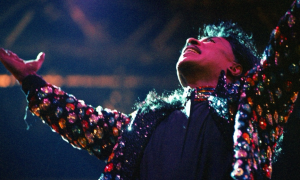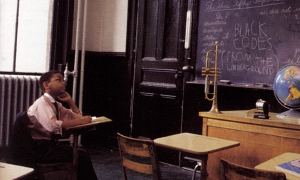Home » Jazz Articles » Opinion » Improvisation...Like The Weather
Improvisation...Like The Weather
Some solos can only be played when there's great silence. It's a kind of quiet that frames the air like the negative space surrounding a sculpture.
 I thought I would talk about improvising and I should say that I'd try to talk about it because words are often difficult for me. My performance world is sonic; more poetry than prose, more like the weather than the forecast—more pliable and less specific—cloud-like and always shifting shape. Not surprisingly, music is the medium through which I prefer to communicate because it holds more energy and the process of spontaneous invention feels more natural. But with the words that I can find, here is what improvising is like for me: I string melodies together in the moment like dreams and somehow it all makes sense. Playing has a way of transforming your mind in the same way a wind can alter a cloudscape. When you are really focused, musical ideas morph and flow seamlessly into one another to form spontaneous compositions.
I thought I would talk about improvising and I should say that I'd try to talk about it because words are often difficult for me. My performance world is sonic; more poetry than prose, more like the weather than the forecast—more pliable and less specific—cloud-like and always shifting shape. Not surprisingly, music is the medium through which I prefer to communicate because it holds more energy and the process of spontaneous invention feels more natural. But with the words that I can find, here is what improvising is like for me: I string melodies together in the moment like dreams and somehow it all makes sense. Playing has a way of transforming your mind in the same way a wind can alter a cloudscape. When you are really focused, musical ideas morph and flow seamlessly into one another to form spontaneous compositions.As a player and a composer I often deal with ambiguity. I have become used to standing at musical precipices, not knowing what's going to happen next, sometimes ready to spring into action but also content to just hang out on the cliff. Whether I'm poised to begin a solo or simply staring at a blank manuscript page, the absence of a safety net is what makes the whole improvisatory adventure so exhilarating.
I spend my time rehearsing how to be spontaneous. 'Rehearsing how to be spontaneous' sounds counterintuitive, but when practicing I exercise music muscles and memory so to be ready for any unpredictable moment. I practice reaching for sounds I can't hear, phrases I can't play, in preparation to solo on one chorus on one night. Ideas come from the most unexpected places. Some of the most profound things learned as an artist are thoughts that have evolved from exposure to subjects other than music. What you carry with you in your work isn't so much what you think as it is how you think. This makes the biggest impact on your music—your mind's openness and ability to process experience in fresh and spontaneous ways throughout life.
Listening deeply to what's around me in the musical landscape, I scan a soundscape to be able to react quickly and shift gears with hyper-drive, turn-on-a-dime steering. Playing can sometimes be like driving a sports car. One never knows what's around the musical bend but you often find yourself accelerating into the turn. Improvising like that is brash and tremendously exciting.
Playing can be tender and expressive too, a whole range of emotions inside a 32-bar chorus. Some solos can be filled with sadness and promise at the same time, like when playing a ballad, which can hold an enormous amount of complexity for a player. The air is saturated with feeling, flooded with multiple layers of emotion all at the same time. Time slows down and notes vibrate with a different intensity. Improvisers have long held that it's how you play a really slow tempo that sets you apart as an artist.
Some solos can only be played when there's great silence. It's a kind of quiet that frames the air like the negative space surrounding a sculpture. A player carves the air like a sculptor cutting away to the heart of an idea. Some solos call up a hundred memories in one moment. It's as if the turn of a musical phrase has condensed a yearning from some deep place in the past into one inflection. You play as if a whole world were inside of one note.
And some solos go one way one day and then go in a completely different direction on another. They're like snowflakes. No two are alike and you have to marvel at that. Trying to recreate solos never works because you can't reshape the honesty of their moment in time. Try to shape the way you play from day to day—but the unexpected ALWAYS happens, so in the end you find that you make a religion out of cherishing the unpredictable nature of things.
Then there are solos that can end and then turn your life upside down. What happens when the high you get from improvising is over? You want it back and you'll do anything to get it—like a fix. Credit cards and cautious living often go out the door when improvisation comes to stay. Improvisers keep going back to the bandstand hoping to find that elusive feeling again and again.
So there's a lot to improvising and none of it is easy to describe. Making music in the moment is a surprising endeavor. It's unpredictable, ambiguous, complex, sad, silent, exhilarating, dangerous, disciplined, expressive, nostalgic and sublimely addictive. There's never a moment like any other and I wouldn't have it any other way—kind of like the weather.
< Previous
New York Eye and Ear Control
Next >
Azucar de Amor
Comments
About Jane Ira Bloom
Instrument: Saxophone, soprano
Related Articles | Concerts | Albums | Photos | Similar ToTags
For the Love of Jazz
 All About Jazz has been a pillar of jazz since 1995, championing it as an art form and, more importantly, supporting the musicians who create it. Our enduring commitment has made "AAJ" one of the most culturally important websites of its kind, read by hundreds of thousands of fans, musicians and industry figures every month.
All About Jazz has been a pillar of jazz since 1995, championing it as an art form and, more importantly, supporting the musicians who create it. Our enduring commitment has made "AAJ" one of the most culturally important websites of its kind, read by hundreds of thousands of fans, musicians and industry figures every month.























